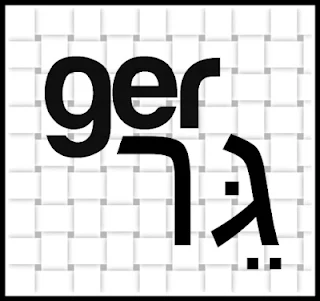There is a common statement from our Sages that raises a lot of eyebrows. In Tractate Niddah 13b, Rashi attempts to explain this passage, but let's be honest, he doesn't really make things any better.
'Gerim are as difficult for the Jewish people as sapachas' (קשים גרים לישראל כספחת) because [being as they weren't raised as Jews] they are not sufficiently knowledgeable of G-d's commandments, and this lack of meticulousness can bring punishments to the Jewish people -- moreover, they can negatively influence the Jewish population in general.Well, tell us how you really feel! And in case you're wondering what sapachas is, it's a type of pesky skin lesion. Then, in Tosafot, commenting on Yevamos 47b, it says,
"Gerim are as difficult fo rthe Jewish people as sapachas because they are not knowledgeable in the details of the commandments, and the Jewish people learn from their actions."Still, not feeling the love here. It's important to understand that there is an idea in Chassidus that after Mashiach comes, there will be no more gerim. Why? The understanding is that only a sincere convert will go through geirus during a time of crisis and persecution. But when things are good for the Jews, people want to take part (just think of the Esther story) in that mazal. Thus, once Mashiach arrives, the doors of conversion are closed for business. I encourage you to jump in while the water is hot and oppressive.
So the question is: Why would Rashi and Tosafot speak so poorly of gerim during the times in which they were living? After all, HaShem demands love and acceptance for the ger, right?
In comes a contradictory explanation from Tosafot in Tractate Kiddushin 70b:
Rabbi Avraham Ger explained that gerim are as difficult for the Jewish people as sapachas because they are fastidious in their observance of the commandments and knowledgeable in the details surrounding them -- which causes G-d to remember the transgressions of those Jewish people who are not performing his will.
If there were a giant "like" button floating over that quote, I'd hope that all of you would smack it until your keyboard-poking finger was bleeding. Although the various renditions of this that I've read in this book don't cite it, I'd have to say that this ties in very closely with what the midrash has to say about Rachav (my favorite convert) and how her actions of identifying HaShem as the one and only, repentance, and geirus were reflected later in the life of her descendent the prophet Jeremiah. In Pesikta de Rav Kahana, Divrei Yirmiyahu 13:5, it says,
“The son of the corrupted one who mended her ways will come and reproach the son of the fit one who had gone astray.”
Also in Pesikta de Rav Kahana, Divrei Yirmiyahu 13:4 it goes so far as to say that whatever was written in Israel's honor was written in Rahav's praise. Just check out the juxtaposition of these:
It is written of Rahab (Josh. 2:12): “Now, since I have shown loyalty to you, swear to me by the Lord.” And of Israel (Jer. 5:2): “They are sure to be swearing falsely." It is written of Rahab (Josh. 2:13): “that you will spare the lives of my father and mother.” And of Israel (Ezek. 22:7): “Fathers and mothers have been humiliated within you."
Thus, I think that the contradictory statement of the Tosafot is probably running with the right message. If not because of the Rachav connection and what the Rabbis had to say about geirus, then perhaps this approach from Bo M'Ephrosa, Parshas Tazria, Shalosh Seudos 5771 will sparkle your fancy:
A sapachas develops on the flesh in order to awaken one to return to G-d, and if, G-d forbid, the individual does not heed the message, he can bring great suffering on himself. Similarly, gerim are to awaken the Jewish people to serve G-d with fiery enthusiasm and meticulous observance of the Torah's commandments. They cause those born jewish to follow their good example and fulfill the commandments with an uplifted soul and not out of habit or rote. If, G-d forbid, those born Jewish do not take inspiration from their example, this can cause great accusations to be brought against them Above. The Sages taught that because Hillel was poor, a poor man could not use poverty as an excuse for not learning Torah. Rabbi Elzar ben Charsom was rich, so a rich man could use his wealth as an excuse. Joseph was able to control his passions, so even the wicked are obligated to do likewise. In the same manner, gerim obligate those born Jewish to act as they should.
Loads of heavy responsibility rests on the shoulders of the ger, whether we know it, like it, or want it. Stay tuned for some more beautiful morsels on Gerim in Chassidic Thought -- including birthdays. Yes, birthdays. For gerim, it's a perplexing question of what to celebrate.










